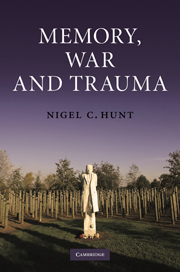Book contents
- Frontmatter
- Contents
- Preface
- 1 Background and purpose
- 2 Historical perspective
- 3 Methods and ethics
- 4 Current theory: post-traumatic stress disorder
- 5 Approaches to understanding trauma
- 6 Positive outcomes of traumatic experiences
- 7 Memory and history
- 8 Personal narrative and social discourse
- 9 Illustrating narrative as a scientific technique: the role of social support
- 10 Ageing, trauma and memory
- 11 Literature and trauma
- 12 Memorialisation and commemoration
- 13 Battlefield tours
- 14 Conclusions and future directions
- References
- Index
6 - Positive outcomes of traumatic experiences
Published online by Cambridge University Press: 05 June 2012
- Frontmatter
- Contents
- Preface
- 1 Background and purpose
- 2 Historical perspective
- 3 Methods and ethics
- 4 Current theory: post-traumatic stress disorder
- 5 Approaches to understanding trauma
- 6 Positive outcomes of traumatic experiences
- 7 Memory and history
- 8 Personal narrative and social discourse
- 9 Illustrating narrative as a scientific technique: the role of social support
- 10 Ageing, trauma and memory
- 11 Literature and trauma
- 12 Memorialisation and commemoration
- 13 Battlefield tours
- 14 Conclusions and future directions
- References
- Index
Summary
Our greatest glory is not in never falling, but in rising every time we fall
ConfuciusThat which does not kill us can only make us stronger
NietzscheThe focus of most research on traumatic stress has, as we have seen in earlier chapters, been on the negative psychological and social consequences of the event or events – how many people experience PTSD, depression or problems with relationships or alcohol, and how many people take years to recover, if they ever do. The focus on the negative is a criticism that is true of much applied psychology, which has usually focused on what is wrong with people and tried to find ways of putting it right. While this is admirable, it is not everything.
Most people who go through traumatic or stressful situations are not traumatised. They come out unscathed, somewhat changed but easily able to cope, or having learned something about life. There should be a focus on more positive aspects of change that occur as a result of being exposed to massively traumatising stimuli, change which may take place immediately but which is more likely to take much longer, perhaps years. This positive focus can teach us a lot about the normal psychological processes that come into play during traumatic situations, but may also aid clinicians and others to assist people with problems. The experience of trauma can help people to develop their understanding of themselves, other people and the world.
- Type
- Chapter
- Information
- Memory, War and Trauma , pp. 81 - 95Publisher: Cambridge University PressPrint publication year: 2010



